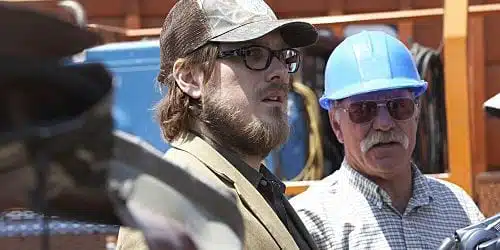
A British comic comes to the States under false pretenses and disguises himself as various stereotypes to put unsuspecting Yanks in awkward situations on camera. Repeatedly, his interviewees don’t know he’s in character, only pretending to be racist, sexist, and/or incompetent. This describes the past 10 years of Sacha Baron Cohen’s work, and now, Mark Wootton in La La Land.
The series opens with a series of stories provided by each of Wootton’s characters as they arrive at LAX with a Hollywood dream in tow. Brendan Allen is a documentary filmmaker, made evident by his scrappy beard, potbelly, and desire for critical relevance. Shirley Ghostman is an effeminate male psychic with mall hair and a checkered past, and Gary Garner is an East London pub-crawler and aspiring actor whose personal hero is Jason Statham. All are hyperbolically affected, but, rest assured, Shirley’s swishy gait and occasional lisp does not make him any more compelling — or humorous, for that matter.
In a word, Wootton’s characters are repellent. There’s nothing redeeming about any of them, and if there’s any lesson to be drawn from the assholes played by Larry David, Ricky Gervais, and Gary Shandling, audiences prefer them to be lovable in some way. Worse, La La Land is not nearly as smart or edgy as Da Ali G Show, as it offers none of the social commentary, cultural criticism or broad pathos that Borat or Bruno mustered, even in their lowest low-brow moments. Instead, Wootton clumsily aims for what might be America’s easiest target: Hollywood.
Fittingly — and disappointingly — his fame-hungry characters don’t raise questions concerning politics or inhabit any realm of social interest; they are as vapid as their environment. When Brendan has an opportunity to pitch an idea to influential producer Sheldon Altfeld, he proposes that his documentary will “break new ground” when he endeavors to film sharks underwater. When Altfeld dismisses the idea as having already “been done,” Brendan continues to explain that the filming would take place inside a protective steel cage. Again, Altfeld assures him, “It’s been done.” But the two still go back and forth and back again on the idea, with Brendan indignantly insisting he’s never heard of any “Jock” Cousteau. The problem with the exchange is that it has no resonance other than to showcase Brendan’s ignorance. (For the record, scenes like this can work. See: Ali G interviewing Noam Chomsky.) Once the scene finally ends, we’ve learned nothing about Brendan as a filmmaker or his underlying ethos, only that he’s stupid. So what?
Brendan is too underdeveloped to invite viewer investment or even much disdain. So too are the show’s supporting characters, like Brendan’s longsuffering PA and camerawoman Kiki. He reportedly spotted her potential while she was dancing in a cage in a Koreatown strip club, and was compelled to hire her on the spot. According to the series’ opening title card, neither Kiki nor anyone other than Wootton is an actor, a fact that makes her one-dimensional depiction unfortunate to the point of offense. Yes, her English is poor, her beginnings inauspicious, but to humiliate her as Brendan does repeatedly for a laugh doesn’t make us loathe Brendan, but rather, Wootton. He confuses her, corrects her, castigates her — but if she’s not in on the joke, how is it funny, exactly?
